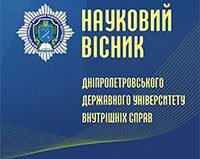Tetyana ZHEGLINSKA, Alina LUKOMSKA
ZHEGLINSKA T., LUKOMSKA A. (2022), Implementation of the state language policy in the professional activity of a police officer, Scientific Bulletin of Dnipropetrovsk State University of Internal Affairs, №4, 407-411
DOI: 10.31733/2078-3566-2022-4-407-411
ABSTRACT. The article deals with problematic issues of the implementation of the state language policy in the professional activity of a police officer. It was established that language and speech competence of police officers are one of the most important elements of their professional training. The article emphasizes that the direct activity of a police officer requires not only professional skills, but also a broad general education, it is inextricably linked with intensive both oral and written communication, and also involves a fairly wide speech practice, which in its the turn requires a clear expression of concepts and categories in various spheres of social life. Language and speech competence is one of the most important factors in the formation of the professional image of a police officer, it is characterized by the direct use of an unlimited number of language units, the corresponding laws of their functioning, operating with them to construct various expressions – from the simplest expression of any feeling to the transmission of intellectual information. After all, it is precisely in the field of speech implementations that the originality of the national language is revealed. Mastering speech competence brings the personality of a police officer to appropriate and adequate speech actions, prepares him for speech practice in natural communication conditions. The article contains a practical component, which consists in the analysis of the problem of surzhik manifestations in the professional speech of future police officers. Thus, it was highlighted that most of the interviewed cadets prefer to communicate with the help of surzhik. The article concludes that every cadet needs to pay attention to their communication and fight bilingualism, because this leads to a deterioration of the impression of police officers as qualified specialists in general. In our opinion, all this is caused, first of all, by the inexperience of the cadets, which cannot in any way correspond to the professional activity of a qualified police officer. After all, a modern policeman is a highly educated and highly moral person who must know not only the laws of Ukraine, but also be able to interpret them professionally in his professional speaking (both oral and written) activities.
Keywords: Ukrainian language, language policy, language and speech competence, surzhik, professional training, police officer.
References
- Bohush, A. M., Tryfonova, O. S., Kyselova, O. I. (2008) Formuvannia movnoi osobystosti na riznykh vikovykh etapakh [The formation of linguistic personality at different age stages] : monohraf. Odesa : PNTs APN Ukrainy, 272 p. [in Ukr.].
- Borynshtein, Ye. (2004) Sotsiokulturni osoblyvosti movnoi osobystosti [Sociocultural features of linguistic personality]. Sotsialna psykholohiya. № 5 (7), pp. 63–82. [in Ukr.].
- Bachevych, F. S. (2004) Osnovy komunikatyvnoi linhvistyky [Basics of communicative linguistics]. Kyiv, 344 p. [in Ukr.].
- Kozmuk, B. P. (2002) Movne zakonodavstvo i movna polityka potrebuiut vdoskonalennia [Language legislation and language policy need improvement]. Pravo Ukrainy. № 10, pp. 70–72. [in Ukr.].
- Movna polityka [Language policy]. URL : http://litopys.org.ua/ukrmova/ um51.htm. [in Ukr.].
- Bilozorov, Ye. V., Vlasenko, V. P., Horova ta in. (2017) Teoriya derzhavy ta prava [Theory of the state and law] : navch. posib. / za zah. red. S. D. Husarieva, O. D. Tykhomyrova. Kyiv, 320 p. [in Ukr.].
- Popovskyi, A. M., Lukomska, A. A. (2020) Mova i kultura movlennia pravookhorontsiv z pohliadu kursanta [Language and speech culture of law enforcement officers from the cadet’s point of view]. Borysten. № 05 (346), pp. 28–34. [in Ukr.].
